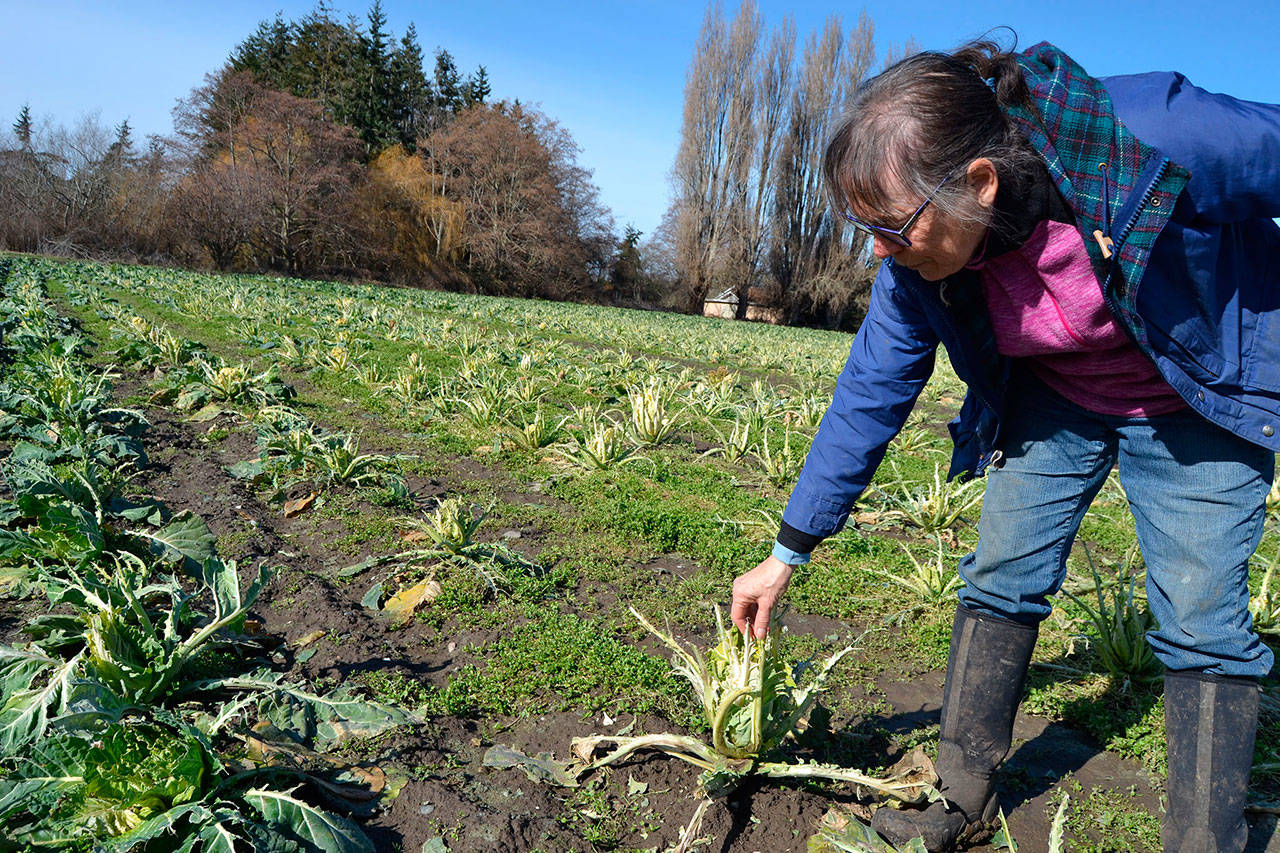Following devastating news that 10 acres of their spring crops were eaten by migrating birds after a heavy February snowfall, staff with Nash’s Organic Produce in Dungeness hope online community support will help make up some of the difference.
Patty McManus-Huber, Nash’s promotions coordinator, launched a $20,000 campaign last week at www.gofundme.com/help-nash039s-farm-recover-from-damage-from-birds.
As of Tuesday, the campaign has exceeded initial expectations with $24,615 and remains ongoing.
“I’m very, very grateful the community has really stepped up,” McManus-Huber said. “This will help us get through the next couple of months. We won’t have crops until early summer.”
Sometime between Feb. 12-15, migrating birds ate 10 acres of purple sprouting broccoli (PSB), Italian cauliflower and kale.
McManus-Huber said it’s likely their regular food sources were covered up by snow so they ate the broccoli and cauliflower because it was poking up through the snow.
Nash Huber has been breeding PSB to become disease- and cold-resistant, and his Italian cauliflower to acclimate to the Northwest weather for years.
McManus-Huber said birds have never eaten the leaves off the broccoli or cauliflower before.
Around this time each year, Nash’s staff begins harvesting the field for weekly farmers markets, including Port Angeles and three in Seattle.
“Simply put, we’re looking at a much, much reduced weekly income from farmers’ markets,” McManus-Huber said. “We’re going to have to look at some of those markets and see if we can do it with no produce. We still have pork, grain, and flour. But if people don’t see vegetables, are they going to come over?”
Community support
This is Nash’s first online campaign and McManus-Huber said the $20,000 goal was to gauge community interest and support.
“I had no idea how much the community would support us,” she said. “We’ll take whatever the community is willing to support us with.”
Support has come in other ways too with community members adding to their totals at Nash’s Farm Store and by simply donating.
Donations can be sent to “Nash’s Organic Produce, P.O. Box 910, Sequim, WA, 98382.”
Those who have donated online seem to support Nash’s efforts with organic produce.
“We want to bring clean, healthy food to the community,” McManus-Huber said. “We want to offer an alternative to food with chemicals. That’s every organic farmer. We want to offer clean, alternative healthy foods.”
Here are a few of the dozens of comments from the online campaign:
“Nash’s is one of the local treasures that makes this area so special!” wrote Sarah Miller.
“Nash’s has been such an integral part of the Organic farming Community in our area. We support them and have enjoyed their produce for years. I hope this helps you get back a little of your huge loss,” wrote Sarah Grossman.
“I donated because I share the Nash’s values. I’m concerned about them and the people they employ,” wrote Kena Warrick.
“Nash’s produces wondrous organic food for our area and beyond. They can’t afford losses like this and we can’t afford to lose Nash’s,” wrote Pam Larsen.
McManus-Huber said she’s been in tears several times after reading the comments.
Flying forward
McManus-Huber said they’ve checked with multiple agencies on the Olympic Peninsula and across the state and don’t anticipate seeing any relief from grants or special funds because much of what’s available applies to elk and deer damage.
Nash’s also doesn’t have insurance on its crops, she said, due to its high costs and minimal payback. She said in this instance, migrating birds wouldn’t be covered, anyway.
As previously reported, Nash’s staff attempt to prevent losses like this from birds with the farm’s carrots by harvesting and placing the carrots in cold storage around mid-November.
McManus-Huber said if the carrots were allowed to stay in the ground longer, they’d become sweeter.
Members of the Olympic Peninsula Audubon Society say Sequim’s swan population has grown in recent years with the last informal count totaling about 200 trumpeter swans in the eastern side of Sequim.
Swans typically come to the area from November to February, Audubon members say.
McManus-Huber said the birds aren’t to blame for the damage because they had nothing else to eat with such an unusual heavy snowfall.
Nash’s Organic Produce, 4681 Sequim-Dungeness Way, Sequim, can be found online at nashs organicproduce.com. Reach its Farm Store at 360-683-4642 and the farm at 360-681-7458.
Editor’s note: Reporter Matthew Nash has no affiliation with Nash’s Organic Produce.
Reach Matthew Nash at mnash@sequimgazette.com.



